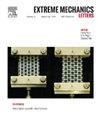Shear localization in gradient high-entropy alloy at high strain rates: Crystal plasticity modeling
Abstract
Gradient-structured metals have attracted a lot of attention due to their good synergy between strength and ductility. However, whether they can be used as a candidate for effective prevention of shear localization failure during high strain rate deformations is still an open question. Corresponding to the particular mechanisms of dynamic recrystallization and twinning at high strain rates, a physically based constitutive model of crystal plasticity is developed, including a new evolution equation for dislocation density and a twinning model, to investigate the detailed process of shear localization of gradient-structured CoCrFeMnNi high-entropy alloys (HEAs). A physically based strain gradient theory is considered to capture the strengthening effect of gradient structures. The competition between microstructural softening and strengthening effects is quantified to reveal the effects of gradient-structure on shear localization and shear localization can be significantly delayed in gradient-structured HEAs. This study contributes to the understanding of the influence of gradient-structure on shear localization and provides insights for further optimization of the mechanical behavior of gradient-structures at high strain rates to develop strong and ductile metals and alloys for dynamic applications.

 求助内容:
求助内容: 应助结果提醒方式:
应助结果提醒方式:


